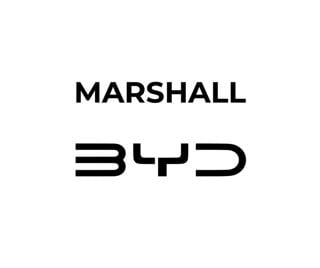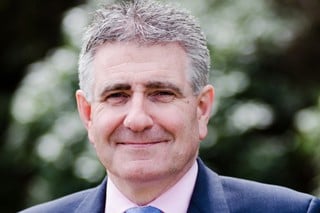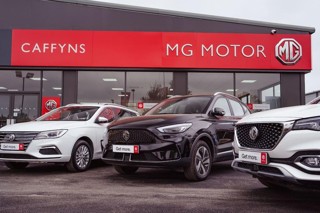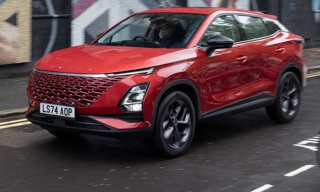To offset any shortfall from faltering new car sales, most of the UK’s listed dealer groups plan to increase used car revenues, prestige representation or operational efficiency
Pendragon
Pendragon’s past 12 months may have seen it relinquish the AM100 top spot for the first time in 18 years following Sytner’s acquisition of CarShop, but its own strategy for used car growth looks to be “on track”.
Pendragon set out a plan to double its used car revenues by 2021 after new car turnover declined 1.4% in the year to December 31, 2016 – despite a 1.9% overall rise in revenue to £4.54 billion and pre-tax profits of £75.4 million, up 3.3% – and reports of a strong start to the year suggest the plan is coming together.
In an interim statement to the London Stock Exchange, covering a period between January 1 and April 26, the Nottingham-based 227-site group reported revenues up 10.4% like-for-like and underlying profit before tax rose 17.6% from the same period last year.
Aftersales gross profit grew by 7.6% like-for-like, while used vehicle gross profit was up 16.5%, compared with flat performance for new vehicles.
Chief executive Trevor Finn said: “Our revenue growth in the used vehicle sector was over 23%, which is significantly ahead of our annual target of double-digit growth and ensures we remain on track to achieve our long-term target of doubling used vehicle revenues by 2021.”
Following publication of positive 2016 results in February, Finn was awarded a further 2.4 million shares in the business under the company’s long-term incentive plan.
The award, worth about £825,000 at a share price of £0.3421 at the time of the move, came in a vesting process which also saw chief operating officer Martin Casha and finance director Tim Holden receive 1.45 million and 1.15 million shares respectively in a total shares bonus worth about £1.71m.
The leadership team’s ongoing success now hinges on growth in used vehicles, aftersales and repair and new vehicle markets.
In 2016, the group sold 159,000 used vehicles, but further growth looks vital after new car revenues fell from £2.22bn to £2.19bn, despite aftersales growth of 4.1% to £316.5m (2015: £303.9m) and overall gross profit up 1.9% to £559.6m (2015: £548.9m).
Pendragon’s plan includes investment in its Evanshalshaw.com and Stratstone.com websites and the introduction of its Pinewood DMS business into Europe. The group will continue its investment in additional physical capacity for used vehicle sales, opening five sites in the first half of 2017, with a further five sites “actively being pursued for the second half of 2017”.
Pendragon’s Move Me Closer online platform – which moves vehicles to sites near customers for a refundable deposit – is also central to growth plans, along with Sell Your Car, a car-buying platform aimed at taking on webuyanycar.com.
Pendragon’s headaches in 2016 went beyond losing its AM100 top spot, however.
It launched a High Court action to stop James Brearley, the former managing director of Pendragon’s Stratstone division, from opening a JLR showroom in Wolverhampton. Brearley’s JRB Automotive partnered with JLR on the project, but Pendragon – which closed its Wolverhampton Land Rover business in 2012 – objected.
JRB later sold the site to Jardine and Brearley became the UK chief executive of Inchcape in December.
Vertu Motors
Vertu Motors chief executive Robert Forrester said the group would continue to grow through acquisition after adding more premium brands to the mix helped to realise a fifth year of record turnover in 2016. It also announced the launch of an online sales platform offering part-exchange valuation and finance.
In the year to February 28, Vertu’s turnover increased 16%, from £2.42bn to £2.82bn. Forrester said: “Our strong balance sheet with net cash of £21m, together with our unutilised debt facilities, provide scope for further scaling up.
“Our fifth consecutive year of growth evidences our continued delivery of this strategy. Significant acquisitions have been integrated through the year and have enriched the premium mix of the franchise portfolio.”
New car volumes in retail at the Gateshead-based 104-site group rose by 4.4% to 41,525 and used by 13.9% to 81,636 – 6.9% and 7.1% like-for-like. Profit before tax rose to £29.8m (up 14.6%) and EBITDA to more than £41.4m (2015: £31.5m) during the reported period.
Strong used car performance and growth in higher-margin service areas were highlighted as adjusted profit before tax rose 15% from £27.4m to £31.5m.
Fleet and commercial vehicle sales represented 23% of group revenues in 2016, on delivery of more than 35,000 vehicles, a rise of 1.3%, down 1.5% like-for-like.
Echoing the trend among the AM100’s big players of adding high-margin premium and luxury brands to their portfolios, Vertu’s 2016 results acknowledged the part played by the “successful integration” of new premium manufacturer partners.
It added Mercedes-Benz in March last year with the acquisition of Greenoaks dealerships in Reading, Slough and Ascot.
Other events in 2016 included Toyota’s introduction to the group and “further enhanced representation with Land Rover, Nissan and Škoda” with the acquisition of Gordon Lamb in June and the acquisition of Leeds Jaguar from Inchcape in May.
Forrester told AM his push for growth was not necessarily a push towards premium: “Our concern is return on capital employed and that means that we are happy to grow with premium or volume manufacturers.”
Vertu’s efforts to improve its aftersales performance have seen a rise in service plan provision, meanwhile, with more than 100,000 customers. Aftersales revenues were up 20.1% to £227m (2015: £189m) during 2016.
Tim Tozer, formerly of Inchcape, AutoBinck and chairman of Vauxhall Motors, joined as operations director responsible for a number of franchises, while Liz Cope, former global brand and research director of Dyson, became chief marketing officer.
Cambria Automobiles
Cambria Automobiles weathered a fall in car sales to turn in a pre-tax profit boost in its interim results.
The group’s new vehicle sales were down 4.6% (like-for-like down 12.4%) in the six months to February 28, but in results published ahead of its August 31 year-end, it said the impact was more than offset by a “substantial increase” in average profit per unit as a result of improved portfolio mix.
Reflecting on the results in an interview with AM, chief executive Mark Lavery put the margin gains down to the success of the group’s increased representation of Jaguar Land Rover and Aston Martin.
The Welwyn Garden City Land Rover business acquired in January 2016 and the Woodford Jaguar Land Rover business acquired in July last year have both contributed to group sales as a Barnet JLR facility nears completion and a Birmingham Aston Martin facility continues to deliver positive results.
Swindon Motor Park, the group’s first business, has been closed to make way for the Swindon Jaguar Land Rover dealership, which is due to begin construction imminently.
Lavery said: “The period saw the new DB11 starting to flow through and also numbers related to the Jaguar F-Pace, which we hadn’t seen the previous year.
“Really, the F-Pace has been Jaguar’s ‘Evoque moment’ and what you see is that sea-change reflected in five dealerships over the course of six months.”
Lavery also partly credited the group’s used car success to its close relationship with JLR, with SUVs increasing the average profit-per-unit 3.5% year-on-year to £1,578.
Overall, used car sales were down 1.2% (like-for like up 1.3%), but, offset by an improvement in profit per unit, revenue grew by 11% to £309.1m in the six-month period and underlying pre-tax profit rose 21.7% to £5.6m.
Aftersales revenue increased by 9.9% (like-for-like up 1.8%) with a gross profit improvement as the group achieved 54.7% overhead absorption, but the results elicited disappointment from Lavery.
He acknowledged the effects on aftersales performance of customers being displaced by redevelopment work at Barnet Jaguar Land Rover, a fire at the group’s Welwyn Garden City facility and a change of DMS which was “not seamless”, adding: “I know we should have done so much better.
“We have 7,100 ‘warranty for life’ plans out there, add to that service plans and other retention tools and we should have around 25,000 customers returning to us for aftersales work.
“Not being able to optimise that potential is a huge frustration, but we know that will change.”
Lavery said he was “pleased with the group’s financial performance” overall in the first half, in an uncertain consumer environment that left Cambria with a cash position of £17.2m (H1 2016: £25.3m), balance sheet with net assets of £45.8m (H1 2016: £37.6m) and a dividend up 25% to 0.25p (H1 2016: 0.2p).
He said: “We are confident that the full-year results will be slightly ahead of the current market expectations.”
Inchcape Retail UK
Stefan Bomhard, group chief executive at Inchcape, said the 117-site UK group put in a resilient profit performance in 2016 ”despite high overheads caused by investments in our sites and operational processes to strengthen the long-term positioning of the business as well as lower new vehicle margin due to the competitive market environment”.
Bomhard credited Inchcape’s “sharper focus” on used vehicles and aftersales with an improvement in results in the UK and Europe.
In the UK, its revenues were up 11.2% at £3bn and profits totalled £63.5m, flat on the previous year.
The business appointed the former managing director of Pendragon’s Stratstone division and Chatfields Trucks, James Brearley, as its new chief executive in December last year. He is charged with implementing a plan that Bomhard believes will result in Inchcape “outperforming our competitors and crystallising the significant organic opportunities of our Ignite strategy”.
Ignite focuses on five strategic objectives – leading in customer experience, delivering the full potential from all revenue streams, becoming manufacturers’ partner of choice, leveraging global scale and investing to accelerate growth.
In an interim report on its trading performance from January 1 to April 30, Inchcape reported growth in the UK, despite the “continuation of new car margin pressures”.
Lookers
Lookers has undergone some changes in leadership since recording a 17% increase in turnover to £4.3bn in 2016 (its eighth year of record profits), with much of its growth coming from increased sales within existing businesses.
Allan Rushforth, formerly Nissan’s vice-president of global sales’ joined Lookers as managing director following the promotion of Nigel McMinn to chief operating officer.
Finance director Robin Gregson was promoted to chief financial officer.
Andy Bruce, Lookers’ chief executive, said: “Nigel’s promotion is richly deserved and recognises his pivotal position in the progress we have made in recent years.”
Following a review of its franchised operations last year, Lookers decided to close or sell 10 underperforming businesses.
It acquired Knights BMW and Mini in a £27.2m cash deal and Drayton Mercedes-Benz and Smart businesses for £55.4m in August last year, but the acquisitions contributed only £131m of the motor division’s £658m rise in turnover.
Bruce said it was “pleasing to see organic growth in turnover of £527m”.
Pre-tax profits across the group increased by 46% to £91.8m in 2016. However, this included a £28m one-off gain from the sale of its wholesale parts division – including parts distribution brands BTN Turbo, FPS and Apec Braking – to Alliance Automotive, which was completed to free cash for expansion.
Lookers’ adjusted pre-tax profit rose 7% to £77.1m in 2016, with adjusted operating profit up 10% at £94.7m and stakeholders’ adjusted earnings per share up 0.63p on 2015 to 15.87p.
New car sales were up almost 22% to 101,931 new cars (2015: 90,009), with used sales up almost 24% to 81,387 (2015: 70,492) during 2016. The launch of a new website in 2017 aims to generate new leads and greater operational efficiencies.
Lookers’ motor division consists of 160 franchised dealerships representing 33 marques at 102 locations.
Bruce said: “We know our strategy of having the right brands in the right locations and excellent execution is the right one and during the year (2016) we’ve managed our portfolio of dealerships to reflect that.”
Lookers improved its gearing ratio from 58% in 2015 to 22% in 2016 and bank facilities, which were renewed and increased to fund the acquisition of Benfield in 2015, stood at £235m (2015: £245m) at the end of the reporting period, of which £160.9m was classed as “unutilised”.
“These bank facilities, together with the group’s strong operational cash flow, indicate that the group has sufficient facilities available to fund its operations and allow for future expansion,” said Bruce.
Caffyns
Following the £7.5m disposal of its Lewes Land Rover dealership to Harwoods in April last year, which netted it £4.7m profit before tax, Caffyns has reported that it is “ideally placed to exploit future business opportunities”.
The Sussex-based group reported turnover from continuing operations up 14% to £212.6m (2015: £186.4m) year-on-year and underlying profit before tax up 37% to £2.05m (2015: £1.5m) in its full year to March 31, 2017.
The Lewes Land Rover site, which contributed £46m sales and £1.5m operating profit in 2015/16, was sold after JLR decided Caffyns’ contract would not be renewed as part of its ‘Arch’ network consolidation.
Nevertheless, the group, which recruited former HR Owen finance director Mike Warren last May, reported like-for-like sales growth in new car volumes of 9.3% and used car volumes of 15.9%.
Caffyns’ chief executive, Simon Caffyn, said: “Our businesses performed well in what was a challenging marketplace.”
Service profitability suffered a “negative impact” from the work required as part of the Volkswagen Group emissions scandal. The remedial work was low-margin and involved certain added costs, such as extra courtesy cars, said Caffyn. However, the group’s Volkswagen new car sales increased by 6%.
Sales volumes at its Audi businesses and Eastbourne Volvo site also grew, and Tunbridge Wells Seat and Škoda have achieved “significant improvements” in profitability, the group said.
“We are concentrating on larger business opportunities in stronger markets to deliver higher returns on capital from fewer, but bigger, sites. We are also more effective in being able to deliver performance improvement,” said Caffyn.
“Our overall success in increasing our new and used sales coupled with our improved aftersales retention programmes will enable us to further enhance profitability.”
Caffyn said the group finished the year with cash reserves and low gearing that left it “ideally placed to exploit future business opportunities”.
It used some of the funds from the Lewes Land Rover sale to reduce its gearing, to buy property in Angmering for the relocation and expansion of its Audi dealership from Worthing in 2018, and to buy 2.1 acres of land at Ashford for its Caffyns Cars used car operation alongside its Vauxhall and Škoda franchises. The group website was also updated.
“Over the last three-year period, the company has recorded 34% like-for-like growth in the number of used cars sold. We continue to see this part of the business as providing a major opportunity for further future growth,” said Caffyn.
Marshall Motor Holdings
Marshall Motor Holdings confirmed its position as the UK’s seventh-largest car retail group in March, posting annual accounts that showed a 54.1% rise in revenues and a 60.4% rise in profit before tax.
Chief executive Daksh Gupta called it a “transformational set of results”, with record revenues of £1.9bn (2015: £1.2bn) and underlying profit before tax of £25.4m (2015: £15.8m).
Gupta said: “2015 was a big year for us and 2016 has proved to be transformational, achieving record levels across the business. The car business has produced double-digit increases in what has been a very challenging year economically.”
Marshall’s new car revenues rose by 54.2% (up 13.1% like-for-like) to £983.3m, used car revenues up 56.4% (8.3% like-for-like) to £718.3m and aftersales revenues up 58.4% (5.7% like-for-like) to £202.6m as the group recorded an underlying operating profit margin of 1.7%, up 18 basis points.
The group sold 48,884 new cars and 37,787 used cars in the 12-month period, bolstered by its £106.9m acquisition of Ridgeway Group in May last year, the £24.4m acquisition of SG Smith in November 2015 and the creation of three new flagship Jaguar Land Rover dealerships.
The Ridgeway acquisition extended the group’s footprint into new territories and added 30 franchises.
However, Marshall has since exited its Toyota and Nissan franchises and bought Leeds Volvo from Harratts.
Mark Raban, Marshall’s chief financial officer, said: “We are comfortable with our debt, which is bang on what we had predicted despite the market headwinds. The EBITDA now stands at 1.2x, which is right where we aim to be, and looking forward we are continuing to grow the group with another £25m-£26m to go out.”
Net debt (excluding asset-backed leasing loans) stood at £54.5m (2015: net cash £24.1m), according to Marshall’s balance sheet.
Asked where Marshall sought to exploit growth in the year ahead, Raban said there were no plans to pursue used sales aggressively, as Pendragon and Sytner have done in recent months.
Raban said: “Our aim is to grow the franchised business. Our target area is England – we don’t see growth outside that area – and we are not targeting used specifically. Our growth will come from new car sales. They bring retention in terms of aftersales and future sales.
“In 2016, 84% of our new car sales were completed with a PCP and customer renewal rates on PCP are in the mid-90s percentage-wise. We are gaining control of that segment two market (two- to three-year-old used cars) that used to be the preserve of the independent and the used car supermarket and we are very content with that.”
Raban acknowledged that it was difficult to predict what 2017 would hold given the economic uncertainty in the marketplace, but suggested that early talk of a near-double-digit new car sales slump were “off the mark”.



















Login to comment
Comments
No comments have been made yet.